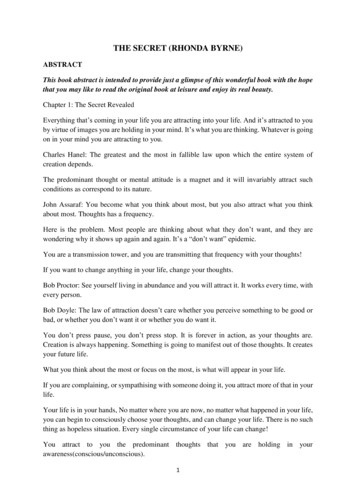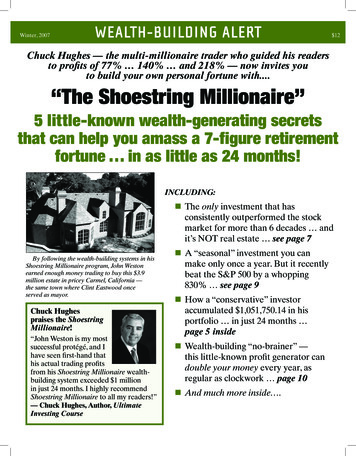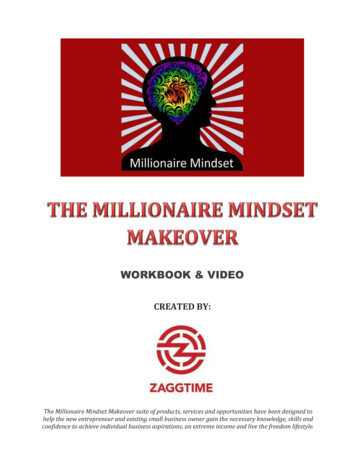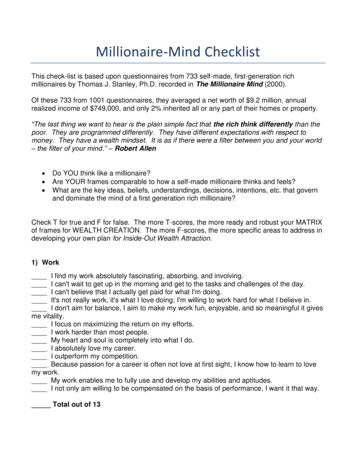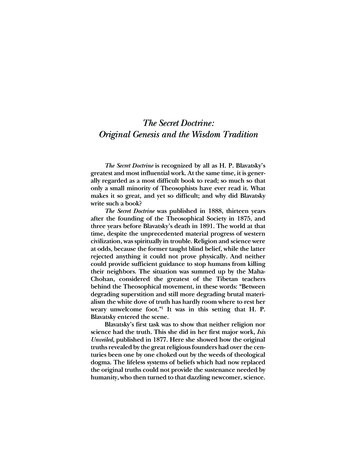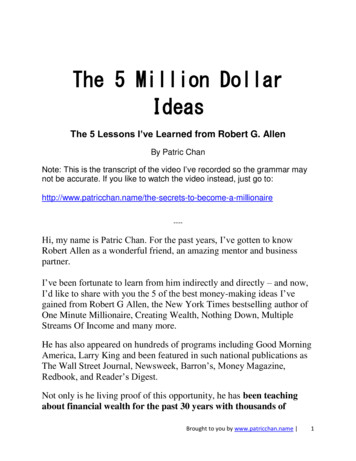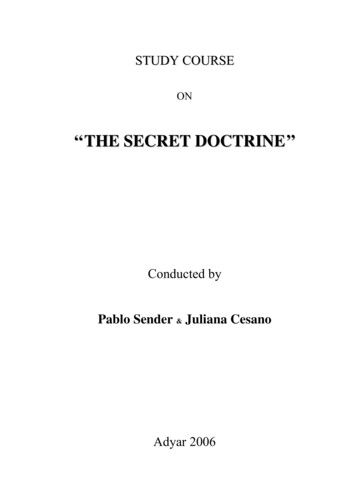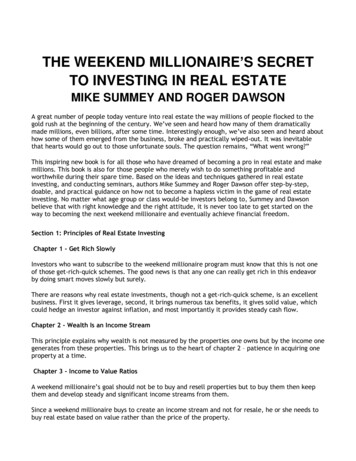
Transcription
THE WEEKEND MILLIONAIRE’S SECRETTO INVESTING IN REAL ESTATEMIKE SUMMEY AND ROGER DAWSONA great number of people today venture into real estate the way millions of people flocked to thegold rush at the beginning of the century. We’ve seen and heard how many of them dramaticallymade millions, even billions, after some time. Interestingly enough, we’ve also seen and heard abouthow some of them emerged from the business, broke and practically wiped-out. It was inevitablethat hearts would go out to those unfortunate souls. The question remains, “What went wrong?”This inspiring new book is for all those who have dreamed of becoming a pro in real estate and makemillions. This book is also for those people who merely wish to do something profitable andworthwhile during their spare time. Based on the ideas and techniques gathered in real estateinvesting, and conducting seminars, authors Mike Summey and Roger Dawson offer step-by-step,doable, and practical guidance on how not to become a hapless victim in the game of real estateinvesting. No matter what age group or class would-be investors belong to, Summey and Dawsonbelieve that with right knowledge and the right attitude, it is never too late to get started on theway to becoming the next weekend millionaire and eventually achieve financial freedom.Section 1: Principles of Real Estate InvestingChapter 1 - Get Rich SlowlyInvestors who want to subscribe to the weekend millionaire program must know that this is not oneof those get-rich-quick schemes. The good news is that any one can really get rich in this endeavorby doing smart moves slowly but surely.There are reasons why real estate investments, though not a get-rich-quick scheme, is an excellentbusiness. First it gives leverage, second, it brings numerous tax benefits, it gives solid value, whichcould hedge an investor against inflation, and most importantly it provides steady cash flow.Chapter 2 - Wealth Is an Income StreamThis principle explains why wealth is not measured by the properties one owns but by the income onegenerates from these properties. This brings us to the heart of chapter 2 – patience in acquiring oneproperty at a time.Chapter 3 - Income to Value RatiosA weekend millionaire’s goal should not be to buy and resell properties but to buy them then keepthem and develop steady and significant income streams from them.Since a weekend millionaire buys to create an income stream and not for resale, he or she needs tobuy real estate based on value rather than the price of the property.
Chapter 4 - Small Rent Increases Snowball Your Net WorthA constant trickle in a bucket could cause it to overflow. The same is true to rents. Increasing rentalfees regularly on a small scale can snowball an investor’s net worth. The effect of it on ones networth may not be glaring at first, but in the long run it will become very noticeable.Chapter 5 - What Makes a Property a Good BuyOne issue beginning investors usually encounter is the issue on what constitutes a good buy. Theearlier this issue is addressed the better. To neglect this could hurt an investor’s portfolio.This book suggests that in order for an investor to assess whether or not a property is a good buy heor she must:Understand that real estate markets vary.Calculate the Net Operating Income (NOI)Calculate the value of the propertyInspect the propertyCheck if the property can show profit in the first yearSection 2: Learning Your Real Estate MarketChapter 6 - Finding a Property ManagerThe first important step in understanding real estate is finding and establishing a good relationshipwith a property manager. This person can be very valuable in helping you see through the nitty-grittyinvolved in renting out and managing properties and guiding you when evaluating new properties tobuy in the future.Hiring a competent property manager can also save you time from doing the trivial and energydraining activities involved in building real estate portfolio thus freeing you to do more importantactivities.Finding a property manager means you have to conduct the following:Find a firm that specializes in property managementMeet to confirm compatibilityRead agreements carefullyAsk if the property manager’s company is licensedInquire if they work with you on new purchaseScreening and hiring the right property manager can be a bit tedious, but the result could be veryrewarding.Chapter 7 - The Threshold TheoryNext to finding the right property manager, understanding the threshold theory can spell out successin real estate investing. This theory espouses that the greater the number of the propertiesinspected by you the greater the chance of you getting an excellent buy. Patience and perseveranceare of course mandatory.
Chapter 8 - Stick with Bread and Butter PropertiesAuthors Mike Summey and Roger Dawson urge beginners in their real estate investing career toconsider sticking with bread and butter properties first if profit is to be maximized.These properties usually boast two to four bedrooms, one to baths and usually come in 800 to 1400square feet. These are popularly known as single-family homes.Because bread and butter properties fall in the middle range of rents in the market these areconsidered the most rentable of all properties and have the biggest potential market. These, too,sell the most quickly.Chapter 9 - Learn Your MarketNothing beats research. Every wise beginning investor should conduct this consistently if only not tobe thrown-out from the game. Research doesn’t have to start in some far-away places because greatdeals can be gathered from the neighborhood of every curious investor.How to do this? This chapter offers down-to-earth tips:RideMap your areaView your target area as a big farmLearn how a deal ripensTalk with peoplePass out business cardsChapter 10 - Don’t Be Discouraged by Asking PricesSavvy investors don’t equate asking price with selling price. Furthermore he or she understands thatsellers usually ask for more than they expect to give them room for negotiation.Here’s how to remain on tract if asking price is too high:Don’t be swayed by appraisal valuesStick to your determination of property valuesDon’t let dissatisfaction deter you from making offersSection 3: How to Find the Ideal SellerChapter 11 - The Seller Has MovedWhen people move they sometimes leave behind properties, which can be a veritable goldmine foran investor.One way of finding an ideal seller is identifying people who have just done this, or who are planningto move. In this chapter, author Mike Summey tells how he closed a deal with a newly marriedwoman who was just too happy to sell a house inherited from her mother. Mike also tells how hisbusiness card led the seller to him. His way of telling why real estate investors should put premiumon whipping up business cards.
Chapter 12 - Sellers Have DivorcedDivorce is another factor why properties are getting sold. Here, Mike recounts how he purchased ahouse owned by a couple that have just went through a divorce and afterwards maintained opposingviews about the property’s disposal.Mike tells how creativity and tact helped him brought two stubborn individuals into agreeing to selltheir property then move on with their lives. Needless to say Mike made handsome profit from thetransaction.Chapter 13 - Seller Has High Equity in the PropertyNot all sellers can be found among the destitute. Some people sell because they have excessproperties. Here Mike shares how, by using good negotiating skills, he was able to close an excellentdeal with an elderly couple that wished to make a good profit from their home.Chapter 14 - Converting Home Equity to Retirement IncomeAging homeowners can be ideal sellers since many of them would rather have their home equitiesconverted to retirement income. Elderly people usually move into retirement communities or withrelatives thus turning their own homes into an encumbrance.Since many of these elderly people are not receiving enough pensions from their social security,turning home equity into a steady income stream becomes an attractive and sound alternative.Chapter 15 - Sellers in Financial TroublePeople with financial trouble almost always make very ideal sellers since their predicament makesthem very flexible. This chapter, aside from giving tips on how to buy from them, explains whybuying from these people does not necessarily constitute taking advantage of their sorry state. Mikecites two instances where his buying from these people actually became instrumental in helpingthem recoup their losses and reestablish themselves.Chapter 16 - Real Estate Owned By BanksBanks too can be a goldmine for a real estate investor. With REO properties reaching up to theirsleeves, banks would be too happy to get rid of some of them for a respectable profit. This is whatmakes banks flexible sellers to Weekend Millionaires.In this chapter, Mike recounts how he closed an excellent deal with a particular bank loaded withREO.Section 4: How to Power NegotiateChapter 17 - Profit Is Made When You BuyWhat every Weekend Millionaire must understand and learn from this chapter is the principle thatprofit is made when he or she buys. The key is understanding the two economic reasons why theprice of real estates goes up, scarcity and inflation.This chapter also espouses the virtue of buying and holding so that properties create a significantcash flow from the start.
Chapter 18 - Negotiating Power PointsUnderstanding pressure points and their effects on sellers coupled with the ability of employing themat the right moment brings a weekend millionaire better deals.The following are pressure points that could be very handy if employed at the right time and for theright purpose:Time PressureInformation PowerProjecting that you are prepared to walk awayChapter 19 - Win-Win NegotiatingSellers need to feel and know that they are not at the losing end of the deal. An investor can reapgreat rewards if he or she is tactful and sensitive enough to understand this and conduct thetransaction in a win-win approach.The winning moves to ensure a win-win negotiation includes:Gathering information about the sellerUnderstanding the motives of the sellerPutting yourself in the seller’ positionEnsuring a win-win negotiation does require that the investor walk an extra mile, but if it meansexcellent deals then the effort is well worth it.Chapter 20 - Beginning Negotiating GambitsSavvy investors have at their disposal smart moves to make sure their deals conclude in a win-winoutcome. This chapter outlines the effective moves or tactics a rookie investor can apply in the earlystage of negotiation with the seller.The important rules when opening a negotiation start with asking for more than you expect to getbecause you might just get it. This gambit, more importantly, can buy you ample room fornegotiation.Other moves include bracketing the seller’s price, taking “No” as an opening negotiating position,never saying “Yes” to the first proposal, playing the reluctant buyer role, and using the viseapproach.Chapter 21 - Middle Negotiating GambitKeeping the momentum going towards a win-win solution requires another set of negotiatinggambits. Below are tips on how to keep the ball in your court:Use the power of a higher authority. This gambit enables an investor to put pressure on theseller without confrontation.Never offer to split the difference. But always encourage sellers to offer to split thedifference.Always ask for a trade-off. Every time a seller asks for favors or concessions in thenegotiations, the investor should immediately ask for a trade off.
Chapter 22 - Ending Negotiating GambitsAll is well that ends well. But concluding negotiations can sometimes turn awry because ofunforeseen factors. To help a weekend millionaire end a negotiation successfully, the authors offerthese guidelines:Understand and employ the good guy/bad guy gambitUse the nibble gambit.Know when to use the walk-away gambitPosition the seller for an easy acceptanceChapter 23 - You’re Negotiating All the TimeFollowing the Weekend Millionaire Program means negotiating all the time and transacting businesswith many kinds of people all the time. This is not just to ensure substantial profit but also to learnand master the ropes of becoming a savvy businessman. The sooner an investor accepts this then thegreater his/her chance of success.Some of the people with whom a real estate investor will negotiate and do business with includeproperty managers, maintenance workers, carpenters, plumbers, brokers and agents, accountants,lawyers, storeowners, local government officials, and other host of professionals.Section 5: How to Structure the OfferChapter 24 - Valuing Single-Family PropertiesMaking money from single-family properties does not just require chutzpah, it also requires carefulstudy and the ability to analyze and calculate risk.The first step in valuing single-family property is to calculate its Net Operating Income (NOI). Thisallows you to see how much the property is worth after deducting vacancy factor, management fee,maintenance reserve, utilities, taxes, insurance, and other incidental expenses.Next to calculation of NOI is the calculation of the Return of Investment (ROI). This involvesunderstanding how financing affects the price you can pay for a property, calculating the property’svalue using different ROI, considering the length of the loan in your calculation, and considering therate of return on the cost of necessary repairs.Chapter 25 - Structuring Your OfferStructuring offers requires math since you need to do calculations, equipments which can help youwith this are available at most bookstores so there is no use to fret.A real estate broker or a real estate attorney can be of great help on this matter and would serve asfigures of authority in reviewing your offers.The most important requirement in writing offers is of course patience. Every investor should knowthat perfection comes only after a series of practices.
Chapter 26 - How to Write an OfferGetting down to the writing of offers can be overwhelming, with so many details to be included andevaluated, but to a weekend millionaire this should present as a challenge rather than as anencumbrance.There is no strict format for drafting an offer; there are just things that must be included in them.All offers should include buyer and seller information, property description, purchase price andpayment of purchase price, condition of property, closing date, occupancy, deed and warranties andtitle review period, closing cost, prorated items, miscellaneous, and termination costs.Optional items that can be included are statement of assignment, apportionment of purchase price,survey, title insurance, inspections, association provisions, financing, use restrictions, and personalproperty.Chapter 27 - Nothing-Down Deals that WorkNo-money down transactions is the most profitable way to invest in the real estate market since itsimply saves the investor from dipping into his pocket while promising him or her a return. However,this kind of transaction should be approached with huge caution or else it could backfire on theinvestor.Finding nothing-down deals that work involves structuring purchases in a manner that NOI coversacquisition costs and understanding how home equity can finance purchases.Chapter 28 - Tax Benefits of Owning Real EstateAside from giving you a steady cash flow, owning a real estate also provides you several tax benefits.This is how government rewards you for taking the initiative of owning properties and in providingvaluable service to your community.Some of these tax breaks are:Favorable income tax treatmentPassive loss deductionInterest deductionDepreciation deductionTax deferral on exchangesTax-free sale potentialCapital Gains taxSection 6: Moving Into Larger PropertiesChapter 29 - Valuing Multifamily PropertiesMulti-family properties offer greater opportunities for a real estate investor but the risk is highertoo. This, however, should not detain a weekend millionaire from doing well in this kind ofinvestment.
This chapter offers practical tips on pricing apartment buildings and discusses the rewards of owningeven one of these properties.There are advantages and disadvantages in buying multi-family properties that is why the authorsrecommend that an investor should stay with single-family homes until he/she gains enoughexperience and develop an emotional grip on how to handle larger properties.Chapter 30 - Valuing Commercial PropertiesCommercial properties, may it be shopping centers, offices, factories, or warehouses, definitely givehigher returns to a real estate investor compared to a single-family unit and an apartment, but thenagain these come with greater risks and require more sophisticated handling.Valuing commercial properties require an investor to consider some possibilities for reference shouldhe/she decide to purchase.Do the properties have generic design?Do the properties need to be customized to suit tenants’ needs?Is the rental clause adjustable?Chapter 31 - Building Your Support TeamNo investor will have a big chance in real estate investing without availing himself of a support team.Professionals like real estate attorneys, accountants, brokers, bankers and others who understand aninvestor’s goals are indispensable to his success.Building a support team requires looking for the right people, communicating goals and expectationsto them, cultivating trust and confidence, and rewarding them appropriately.To build strong banking relations you will have to consult these guidelines:Pay in a timely mannerKeep your banker informedBuild cash reservesMaintain your propertiesTake your bankers for a rideBe fairDon’t put all your eggs in one basketSection 7: Getting StartedChapter 32- What to Do on Your First WeekendBecoming a weekend millionaire in real estate involves a lot of “firsts” of which is the challengingfirst weekend. What does an aspiring weekend millionaire do during the first weekend?The first weekend is for learning the market. This means familiarizing your surroundings, covering aradius of at least 10 miles around your house. This also means getting yourself a detailed map of yourarea which could help you locate tracts of starter homes.
Chapter 33 - What to Do on Your Second WeekendAfter identifying the area you are interested in, you are now ready to conduct the second weekendassignment – learning more about the area you’ve selected.Observing how the properties in the neighborhood are maintained and talking to people you see helpyou assess whether or not you want to invest in the area.Getting a Multiple Listing Service (MLS) book from a real estate agent or a property manager canspeed up your search for ideal properties.Chapter 34 - What to Do on Your Third WeekendHiring yourself property managers makes up your assignment for the third weekend. This is crucialsince this is the first time you are going to surround yourself with people who can be valuable inhelping you identify for sale properties and inspect them. They, too, can substantially help you drafta good offer.Chapter 35 - What to Do on Your Fourth WeekendCalling the owners and visiting at least three FSBO (for sale by owner) properties keeps you on theroad on the fourth weekend.Give yourself an hour to inspect each of the three properties you’ve identified. To maximize time,have a checklist to guide you through the inspection process. For starter, use the sample inspectionform found in Appendix A of this book.After each inspection give yourself time to estimate total cost of repairs necessary to spruce up theplace. Vendors and suppliers are eager to help you with this.Chapter 36 - What to Do on Your Fifth WeekThe toughest part of becoming a weekend millionaire comes on the fifth week – making the firstoffer.Before rushing to this part, you are strongly advised to review chapters 24 – 26 of this book to armyou with the necessary tools on how to:Value single-family propertiesStructure your first dealWrite your offerThen present your offer to the sellers, but don’t press them into deciding immediately. Encouragethem to study your offer thoroughly, this gives them the impression you are not an over-anxiousbuyer.Do reward yourself afterwards for accomplishing the task. A nice dinner would do.
Chapter 37 - What to Do on Your Sixth WeekendThis weekend’s assignment includes inspecting properties listed for sale with real estate brokers,inspecting and obtaining rough estimates on the cost of repairs that would restore the property intoits former condition.Caution: Don’t let the broker rush you into buying. Work at your own pace and trust your judgment.Chapter 38 - What to Do on Your Seventh WeekendThis weekend is dedicated to making other offers on the properties you’ve expected with the brokerslast weekend. Once again you are advised to review chapter 24-26 of this book.The more offers you make the greater the chances of you getting excellent deals.Chapter 39 - What to Do on Your Eighth WeekendSharpen the saw. This weekend’s assignment requires you to do the steps you’ve performed for thepast weekends. Remember to bring your business cards and be more attentive and perceptive towhat you see.Practice makes perfect. This is also true in real estate investing. The eighth weekend is also a timeto renew your commitment to stay focused in your goal – to become a full-pledged weekendmillionaire.Chapter 40 - Biggest Mistakes New Investors Make (Bonus Chapter)As closing, this chapter enumerates common mistakes or pitfalls new and over-eager investors make.By enumerating and discussing these in this chapter, authors Mike Summey and Roger Dawson hopethat you will develop the fine ability to identify any of these and effectively avoid your doing them.These common mistakes include:Being impatientCommingling your accountsBuying upscale propertiesBuying properties just because it is cheapInflating your net worthNot understanding that wealth is an income streamTrying to do everything yourselfFear of bad experienceBuying out of areaBuying other than basic rental propertyGambling on prices going upBlanket encumbranceBuying property controlled by homeownersProcrastinationThe journey of a thousand miles begins with a single step and the same is true with the journey ofbecoming a weekend millionaire. One intelligent step at a time and the goal can’t be very far.
A weekend millionaire’s goal should not be to buy and resell properties but to buy them then keep them and develop steady and significant income streams from them. Since a weekend millionaire buys to create an income stream and not for resale, he or she needs to buy real estate

